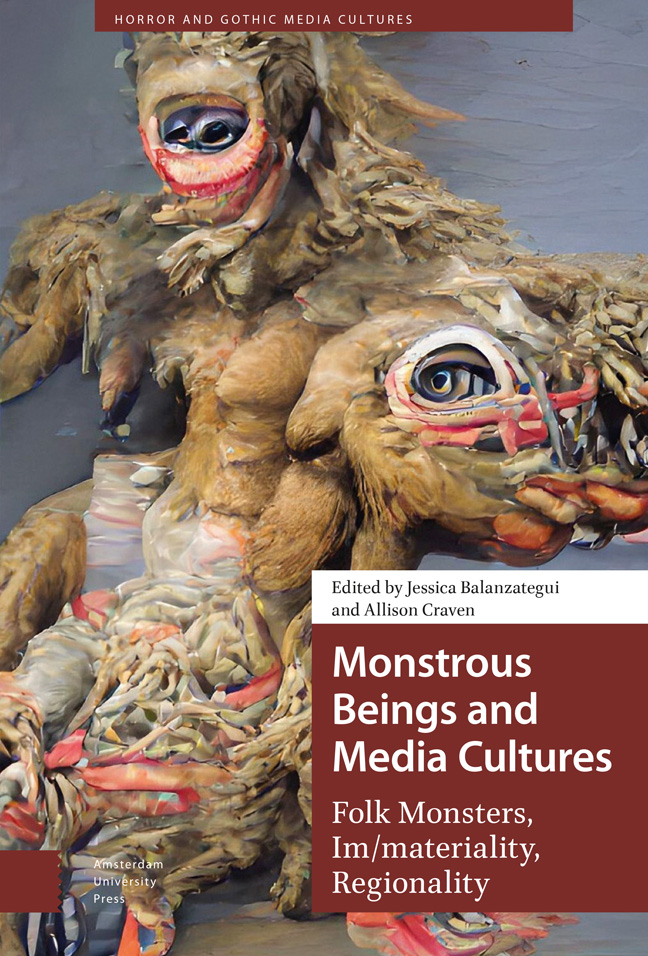Book contents
- Frontmatter
- Contents
- List of Figures
- Acknowledgements
- Introduction: Folk Monsters and Monstrous Media: The Im/materialties, Modalities, and Regionalities of Being(s) Monstrous
- 1 The Momo Challenge as Urban Legend: Child and Adult Digital Cultures and the Global Mediated Unconscious
- 2 “Every Imaginable Invention of the Devil”: Summoning the Monstrous in Eurocentric Conceptions of Voodoo
- 3 The Forest and the Trees: The “Woods” as Intersection between Documentary, Fairy Tale, and Internet Legend in Beware the Slenderman
- 4 Mark Duplass as Mumblegore Serial Killer: Fictional Vernacular Filmmaking in the Creep Series
- 5 Monsters in the Forest: “Little Red Riding Hood” Crimes and Ecologies of the Real and Fantastic
- 6 A Mother's Milk: Motherhood, Trauma, and Monstrous Children in Folk Horror
- 7 Documenting the Unheard: The Poetics of Listening and Empathy in The Family
- 8 Reimagining the Pontianak Myth in Malaysian Folk Horror: Flexible Tradition, Cinema, and Cultural Memory
- 9 An Uncommon Ancestor: Monstrous Emanations and Australian Tales of the Bunyip
- 10 The Folk Horror “Feeling”: Monstrous Modalities and the Critical Occult
- Works Cited
- Mediagraphy
- Index
2 - “Every Imaginable Invention of the Devil”: Summoning the Monstrous in Eurocentric Conceptions of Voodoo
Published online by Cambridge University Press: 17 February 2024
- Frontmatter
- Contents
- List of Figures
- Acknowledgements
- Introduction: Folk Monsters and Monstrous Media: The Im/materialties, Modalities, and Regionalities of Being(s) Monstrous
- 1 The Momo Challenge as Urban Legend: Child and Adult Digital Cultures and the Global Mediated Unconscious
- 2 “Every Imaginable Invention of the Devil”: Summoning the Monstrous in Eurocentric Conceptions of Voodoo
- 3 The Forest and the Trees: The “Woods” as Intersection between Documentary, Fairy Tale, and Internet Legend in Beware the Slenderman
- 4 Mark Duplass as Mumblegore Serial Killer: Fictional Vernacular Filmmaking in the Creep Series
- 5 Monsters in the Forest: “Little Red Riding Hood” Crimes and Ecologies of the Real and Fantastic
- 6 A Mother's Milk: Motherhood, Trauma, and Monstrous Children in Folk Horror
- 7 Documenting the Unheard: The Poetics of Listening and Empathy in The Family
- 8 Reimagining the Pontianak Myth in Malaysian Folk Horror: Flexible Tradition, Cinema, and Cultural Memory
- 9 An Uncommon Ancestor: Monstrous Emanations and Australian Tales of the Bunyip
- 10 The Folk Horror “Feeling”: Monstrous Modalities and the Critical Occult
- Works Cited
- Mediagraphy
- Index
Summary
Abstract
This chapter considers the conflation of the Eurocentric conceptualisation of the devil with the African figure Papa Legba in an analysis of how the crossroads manifest as a key locus of cultural and ideological exchange in North American screen and popular culture. The focus is particularly the Southern Gothic genre – spanning film, television, music, and literature – and its constructions of “Voodoo,” which highlight how the Southern Gothic assimilates and reflects upon the otherness of the American South. Underpinning this otherness is the intermediate space of the crossroads, where the boundaries between life and death, good and evil, and Black and white break down to reveal some of the socio-historical tensions that have informed the construct of the Gothic South.
Keywords: Voodoo, Papa Legba, Southern Gothic, Crossroads, Folkloresque
You sprinkled hot foot powder, mmm, mmm, around my door, all around my door.
Robert Johnson Hellhound on my TrailThe legend of US blues musician Robert Johnson selling his soul to the devil at the crossroads in return for success has, for decades, shrouded Johnson's life and career in a mythic discourse, with proponents of the legend claiming that the proof of the story's veracity is in the lyrics. With references to hot foot powder, hellhounds, and walking side by side with the devil, the imagery evoked in Johnson's songs is more likely to evidence not a Faustian pact but the culturally specific folk beliefs and superstitions that circulated through the African American population in Hazlehurst, Mississippi, where Johnson grew up. As Barry Lee Pearson and Bill Mc-Culloch (2003), researchers into Johnson mythology, argue, the legend was constructed “well after Johnson's lifetime to support a romanticized image of an American musical icon and make Johnson more appealing to people who were unfamiliar with his culture” (102). The “culture” Pearson and McCulloch refer to is the culture of the South: specifically, the culture of Black people of the South, whose links to their African roots and identity have historically manifested in spiritual practices that were imported with slavery and became enmeshed with Christianity, through both forced and voluntary conversion.
- Type
- Chapter
- Information
- Monstrous Beings and Media CulturesFolk Monsters, Im/materiality, Regionality, pp. 63 - 80Publisher: Amsterdam University PressPrint publication year: 2023

